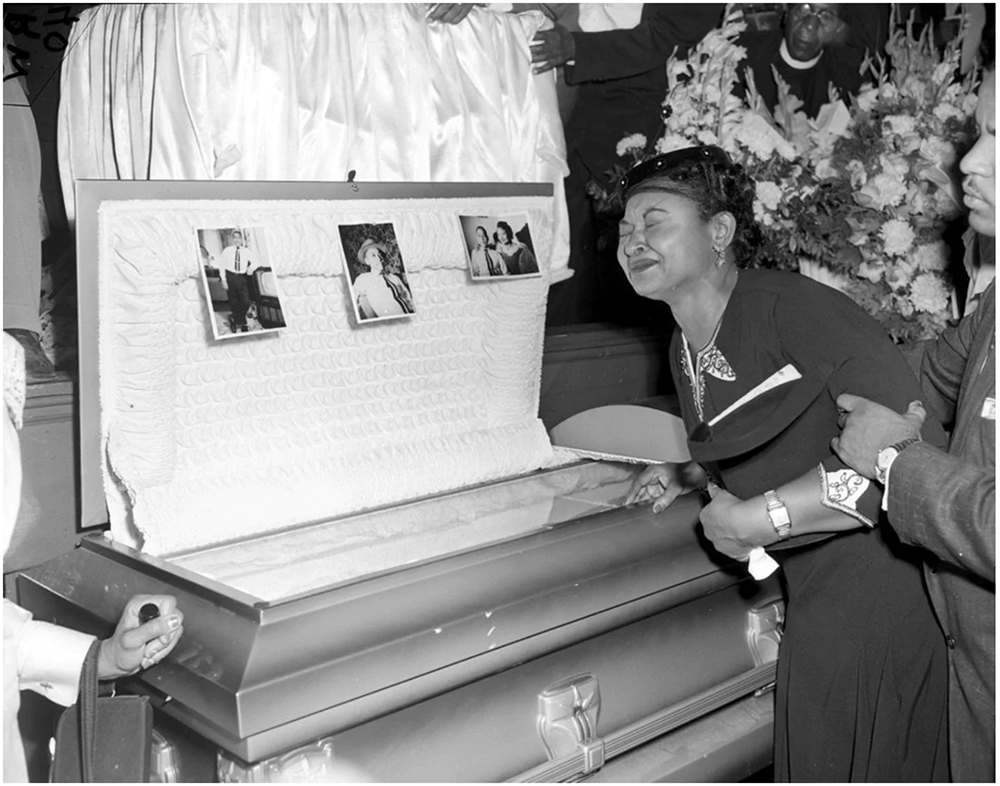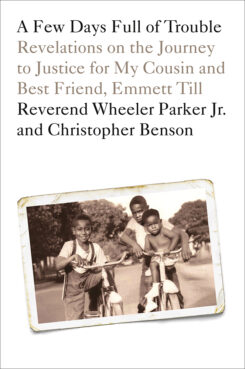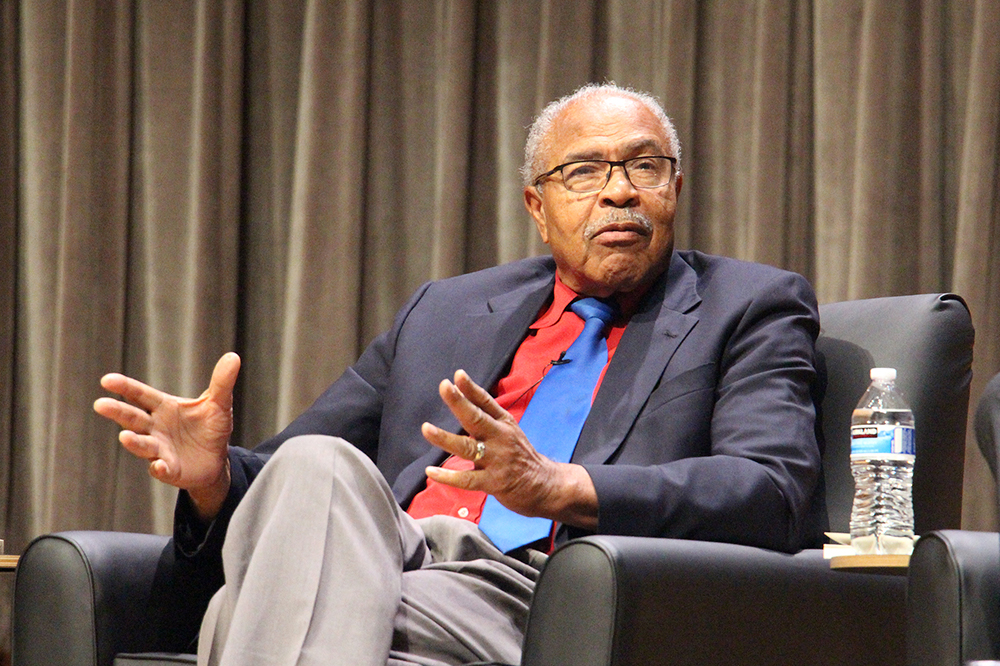WHEATON, Ill. (RNS) — The Rev. Wheeler Parker Jr. still remembers clearly the moment as a teenager he thought he was going to die.
Parker was 16 years old, visiting family in Mississippi, when he woke in the early morning hours to the sound of voices in the house. Moments later, the door to his bedroom opened and a man pointed a flashlight and a pistol in his face.
He shut his eyes tight, but the shot never came.
The man moved on to the next bedroom and the next before finding and kidnapping his cousin — Emmett Till.
It was the last time he saw his best friend alive, Parker, now in his 80s, told a packed concert hall Tuesday night (Oct. 25) at Wheaton College, the evangelical flagship school in the Chicago suburbs.
What happened next — Till’s brutal murder, his mother’s decision to allow an open casket at the 14-year-old victim’s funeral, so the country could see what had been done to her son — shone a light on racial violence in the United States and became a catalyst for the civil rights movement.

Mamie Till-Mobley weeps at her son’s funeral on Sept. 6, 1955, in Chicago. (Chicago Sun-Times/AP Photo)
“A picture’s worth a thousand words. That picture made a statement. It went throughout the world, all over the world, and it still speaks,” Parker said of the photographs of Till in his casket, taken by David Jackson and first published in Jet magazine.
The story of Till continues to resonate because it “provides us with a lens to understand racial conflict in our own moment,” said Theon Hill, associate professor of communications at Wheaton College and primary organizer and moderator of Tuesday’s event, “Remembering Emmett Till: A Conversation on Race, Nation and Faith.”
“When we see George Floyd killed right in front of us due to the officer’s knee,” said Hill, “when we see Breonna Taylor’s death, when we see Ahmaud Arbery, we’re trying to make sense of what’s happening, and Till’s death, as tragic as it will always be, provides us with a grammar to understand this is what’s happening and this is how you might respond in your moment.”
The enduring relevance of Till’s death is apparent in the Emmett Till Antilynching Act, making lynching a federal hate crime and signed in March by President Joe Biden, nearly 70 years after Till’s murder.

“A Few Days Full of Trouble: Revelations on the Journey to Justice for My Cousin and Best Friend, Emmett Till” by the Rev. Wheeler Parker Jr. and Christopher Benson. Courtesy image
It’s also borne out in the critical acclaim for a new film, “Till,” centering on Till’s mother, Mamie Till-Mobley, and her fight for justice for her son, which appears in theaters nationwide this week. In January, Parker will publish his recollections of his cousin, “A Few Days Full of Trouble: Revelations on the Journey to Justice for My Cousin and Best Friend, Emmett Till.”
It was 30 years before anybody asked Parker his account of what had happened over the handful of days in 1955 he and his cousin, who lived in Chicago, spent in Mississippi visiting family, according to Parker, the last surviving witness to Till’s abduction.
In Parker’s account, Till is a jokester, the boy next door he accompanied fishing, picnicking and on other trips. When his cousin found out he was planning to take the train down South to visit his grandfather, he insisted on going too.
“If you didn’t live in Mississippi at that time or experience what it was like, you have no idea what it was like,” Parker said.
He had lived in the South until he was 7 and knew “what you had to do to stay alive and what could happen to you,” he said.
Till didn’t.
When the younger boy whistled in the presence of a white woman outside a store, Parker said, the cousins left in a hurry. He worried what could happen in a place and time when a Black man couldn’t so much as look at a white woman, he said.
But days passed, and they’d nearly forgotten about the incident. Then came the moment Parker heard voices in his grandfather’s home at about 2:30 a.m. on a Sunday morning, asking about the boys from Chicago.
“Sunday morning should be the safest place on earth for a young man in his house — on Sunday morning, waiting to go to church,” he said.
Shaking and sure he was about to die, he prayed, “God, if you just let me live, I’m going to get my life together.”
That Monday, he returned to Chicago alone, his life changed “completely,” said Parker, now pastor and district superintendent of the Argo Temple Church of God in Christ in Summit, Illinois.

The Rev. Wheeler Parker Jr. speaks during the “Remembering Emmett Till: A Conversation on Race, Nation and Faith” event at Wheaton College, Oct. 25, 2022, in Wheaton, Illinois. RNS photo by Emily McFarlan Miller
What happened to Till changed the country, too.
Dave Tell, author of the 2019 book “Remembering Emmett Till,” told the audience Tuesday night that he had become invested in civil rights because of Till’s story.
“The Till story prompted a new generation to stand up for justice, and I think the good news of the night is that the Till story — Rev. Parker’s story — is still motivating a new generation,” Tell said.
It’s a story, he said, the U.S. needs to hear today more than ever. Considering the stories of Floyd and others against the backdrop of Till’s murder, it’s hard to minimize their killings as “a problem of a bad apple or bad cop,” he said.
And the church has a role to play in sharing that story, both Tell and Parker agreed.
The biblical Book of Genesis tells the story of Abel, murdered by his brother Cain, Tell pointed out. In the story, God says Abel’s blood cries out to him from the ground, where Cain has tried to bury what he did.
If God demands that voices that have been buried be brought to light as part of the work of justice and healing, shouldn’t the church? Tell asked.
“We’ve got to keep the legacy going — got to keep the story going — and not with animosity,” Parker added.
“Just tell the story. It’s history. It’s real. Tell what happened,” he said.
